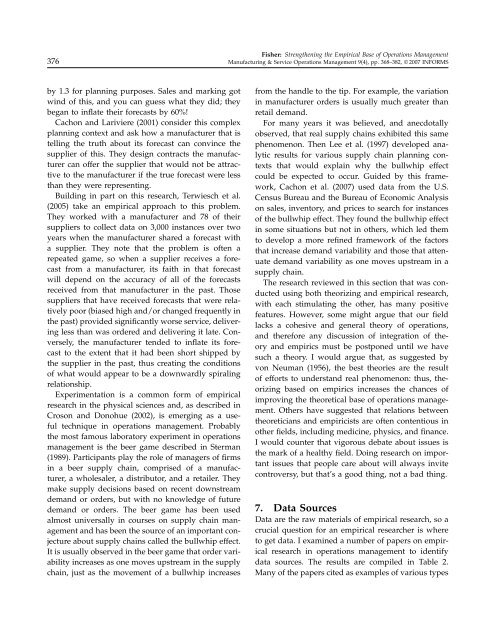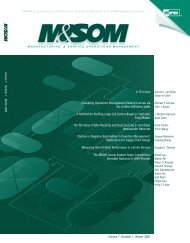Strengthening the Empirical Base of Operations Management
Strengthening the Empirical Base of Operations Management
Strengthening the Empirical Base of Operations Management
Create successful ePaper yourself
Turn your PDF publications into a flip-book with our unique Google optimized e-Paper software.
Fisher: <strong>Streng<strong>the</strong>ning</strong> <strong>the</strong> <strong>Empirical</strong> <strong>Base</strong> <strong>of</strong> <strong>Operations</strong> <strong>Management</strong><br />
376 Manufacturing & Service <strong>Operations</strong> <strong>Management</strong> 9(4), pp. 368–382, © 2007 INFORMS<br />
by 1.3 for planning purposes. Sales and marking got<br />
wind <strong>of</strong> this, and you can guess what <strong>the</strong>y did; <strong>the</strong>y<br />
began to inflate <strong>the</strong>irforecasts by 60%!<br />
Cachon and Lariviere (2001) consider this complex<br />
planning context and ask how a manufacturer that is<br />
telling <strong>the</strong> truth about its forecast can convince <strong>the</strong><br />
supplier<strong>of</strong> this. They design contracts <strong>the</strong> manufacturercan<br />
<strong>of</strong>fer<strong>the</strong> supplierthat would not be attractive<br />
to <strong>the</strong> manufacturer if <strong>the</strong> true forecast were less<br />
than <strong>the</strong>y were representing.<br />
Building in part on this research, Terwiesch et al.<br />
(2005) take an empirical approach to this problem.<br />
They worked with a manufacturer and 78 <strong>of</strong> <strong>the</strong>ir<br />
suppliers to collect data on 3,000 instances over two<br />
years when <strong>the</strong> manufacturer shared a forecast with<br />
a supplier. They note that <strong>the</strong> problem is <strong>of</strong>ten a<br />
repeated game, so when a supplier receives a forecast<br />
from a manufacturer, its faith in that forecast<br />
will depend on <strong>the</strong> accuracy <strong>of</strong> all <strong>of</strong> <strong>the</strong> forecasts<br />
received from that manufacturer in <strong>the</strong> past. Those<br />
suppliers that have received forecasts that were relatively<br />
poor(biased high and/orchanged frequently in<br />
<strong>the</strong> past) provided significantly worse service, delivering<br />
less than was ordered and delivering it late. Conversely,<br />
<strong>the</strong> manufacturer tended to inflate its forecast<br />
to <strong>the</strong> extent that it had been short shipped by<br />
<strong>the</strong> supplierin <strong>the</strong> past, thus creating <strong>the</strong> conditions<br />
<strong>of</strong> what would appearto be a downwardly spiraling<br />
relationship.<br />
Experimentation is a common form <strong>of</strong> empirical<br />
research in <strong>the</strong> physical sciences and, as described in<br />
Croson and Donohue (2002), is emerging as a useful<br />
technique in operations management. Probably<br />
<strong>the</strong> most famous laboratory experiment in operations<br />
management is <strong>the</strong> beergame described in Sterman<br />
(1989). Participants play <strong>the</strong> role <strong>of</strong> managers <strong>of</strong> firms<br />
in a beersupply chain, comprised <strong>of</strong> a manufacturer,<br />
a wholesaler, a distributor, and a retailer. They<br />
make supply decisions based on recent downstream<br />
demand or orders, but with no knowledge <strong>of</strong> future<br />
demand ororders. The beergame has been used<br />
almost universally in courses on supply chain management<br />
and has been <strong>the</strong> source <strong>of</strong> an important conjecture<br />
about supply chains called <strong>the</strong> bullwhip effect.<br />
It is usually observed in <strong>the</strong> beergame that ordervariability<br />
increases as one moves upstream in <strong>the</strong> supply<br />
chain, just as <strong>the</strong> movement <strong>of</strong> a bullwhip increases<br />
from <strong>the</strong> handle to <strong>the</strong> tip. For example, <strong>the</strong> variation<br />
in manufacturer orders is usually much greater than<br />
retail demand.<br />
Formany years it was believed, and anecdotally<br />
observed, that real supply chains exhibited this same<br />
phenomenon. Then Lee et al. (1997) developed analytic<br />
results for various supply chain planning contexts<br />
that would explain why <strong>the</strong> bullwhip effect<br />
could be expected to occur. Guided by this framework,<br />
Cachon et al. (2007) used data from <strong>the</strong> U.S.<br />
Census Bureau and <strong>the</strong> Bureau <strong>of</strong> Economic Analysis<br />
on sales, inventory, and prices to search for instances<br />
<strong>of</strong> <strong>the</strong> bullwhip effect. They found <strong>the</strong> bullwhip effect<br />
in some situations but not in o<strong>the</strong>rs, which led <strong>the</strong>m<br />
to develop a more refined framework <strong>of</strong> <strong>the</strong> factors<br />
that increase demand variability and those that attenuate<br />
demand variability as one moves upstream in a<br />
supply chain.<br />
The research reviewed in this section that was conducted<br />
using both <strong>the</strong>orizing and empirical research,<br />
with each stimulating <strong>the</strong> o<strong>the</strong>r, has many positive<br />
features. However, some might argue that our field<br />
lacks a cohesive and general <strong>the</strong>ory <strong>of</strong> operations,<br />
and <strong>the</strong>refore any discussion <strong>of</strong> integration <strong>of</strong> <strong>the</strong>ory<br />
and empirics must be postponed until we have<br />
such a <strong>the</strong>ory. I would argue that, as suggested by<br />
von Neuman (1956), <strong>the</strong> best <strong>the</strong>ories are <strong>the</strong> result<br />
<strong>of</strong> efforts to understand real phenomenon: thus, <strong>the</strong>orizing<br />
based on empirics increases <strong>the</strong> chances <strong>of</strong><br />
improving <strong>the</strong> <strong>the</strong>oretical base <strong>of</strong> operations management.<br />
O<strong>the</strong>rs have suggested that relations between<br />
<strong>the</strong>oreticians and empiricists are <strong>of</strong>ten contentious in<br />
o<strong>the</strong>rfields, including medicine, physics, and finance.<br />
I would counterthat vigorous debate about issues is<br />
<strong>the</strong> mark <strong>of</strong> a healthy field. Doing research on important<br />
issues that people care about will always invite<br />
controversy, but that’s a good thing, not a bad thing.<br />
7. Data Sources<br />
Data are <strong>the</strong> raw materials <strong>of</strong> empirical research, so a<br />
crucial question for an empirical researcher is where<br />
to get data. I examined a number<strong>of</strong> papers on empirical<br />
research in operations management to identify<br />
data sources. The results are compiled in Table 2.<br />
Many <strong>of</strong> <strong>the</strong> papers cited as examples <strong>of</strong> various types




